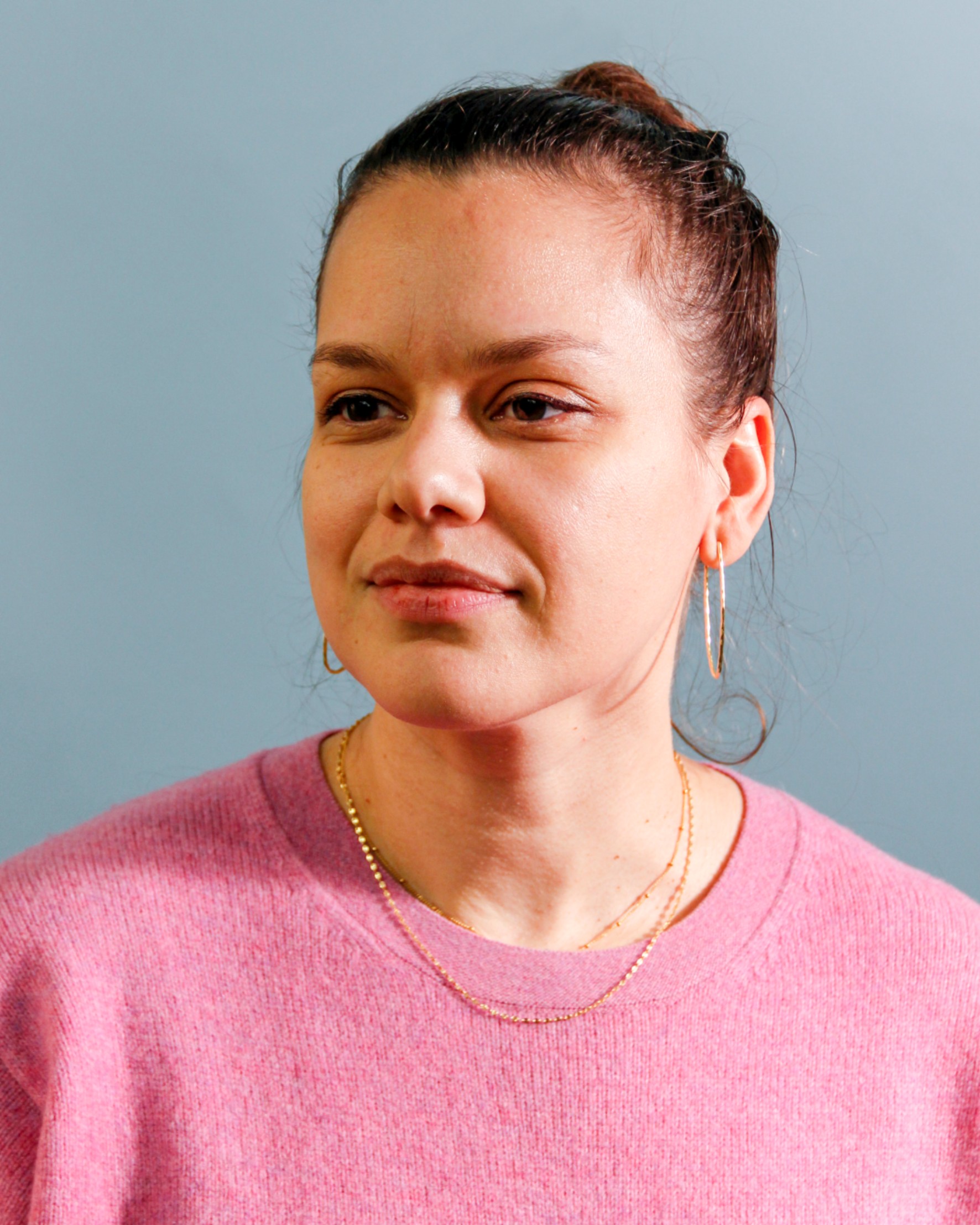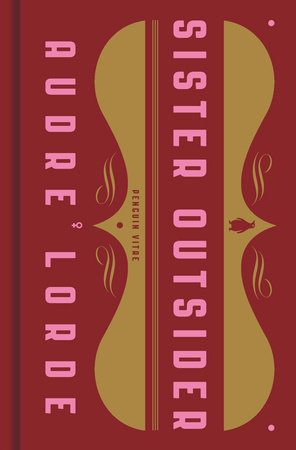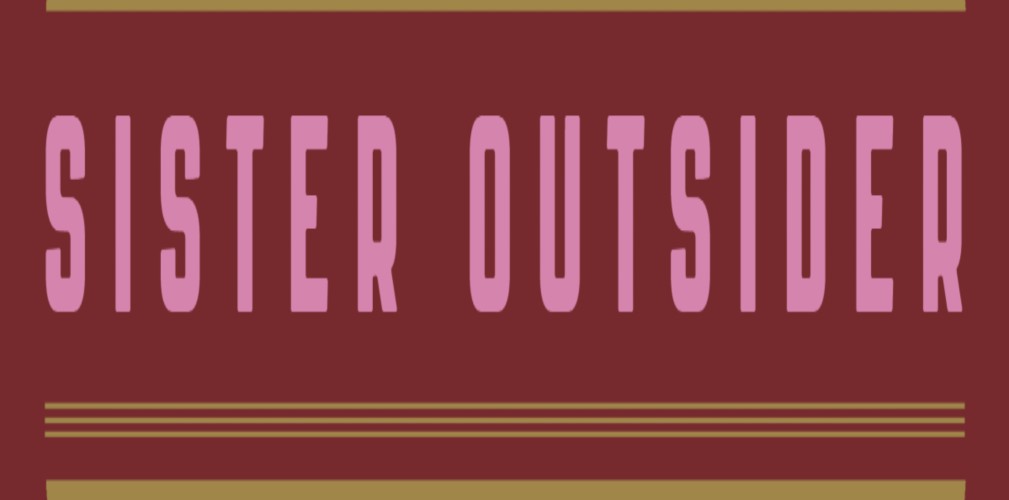Audre Lorde Taught Us: Christina Olivares on Audre Lorde’s Important Legacy

Author: Mahogany L. Browne
February 24, 2020
I have found a new language within the language of Audre Lorde. I have learned to locate the anger threatening to peel the skin from my own bones and with Sister Outsider, I apply pressure. I apply pleasure. I am becoming whole. When I ask other writers from all walks of life their literary pillars, more times than not Audre Lorde’s name is listed. This is a series of questions and answers featuring some of the most profound thinkers, artists, writers, educators, poets, and activists of our time.
This is in celebration of the re-release Penguin Vitae hardback edition of Audre Lorde’s Sister Outsider. In this post, I asked poet Christina Olivares about her relationship to Lorde’s work. Enjoy the dirge work.
Christina Olivares is the author of No Map of the Earth Includes Stars (2015), winner of the 2014 Marsh Hawk Press Book Prize, and of the chaplet Interrupt (2015), published by Belladonna* Collaborative; a second full-length book of poetry is forthcoming in October 2020 from YesYes Books. Olivares was a 2019 Finalist for the Jerome Foundation Artist Grant and is the recipient of a 2017 BRIO Nonfiction Writing Award, a 2015-2016 Lower Manhattan Cultural Council Workspace Residency, and two Jerome Foundation Travel and Study Grants (2010, 2014). Olivares is a high school educator and has taught as a visiting professor in the Rutgers-Newark MFA program. Olivares identifies as queer, as mixed Cuban-American, and as a New Yorker from the Bronx, and is a poverty and prison abolitionist.
Talk about your introduction to Lorde’s work?
Of the complex and heady treasure that is Sister Outsider, certain moments in “Age, Race, Class and Sex” have profoundly helped my self-actualization and understanding of social responsibility. Two that surface quietly in my introduction are Lorde’s assertions that the “true focus of revolutionary change is never merely the oppressive situations which we seek to escape, but that piece of the oppressor which is planted deep within each of us, and which knows only the oppressor’s tactics, the oppressors’ relationships” and that “we have all been programmed to respond to the human differences between us with fear and loathing and to handle that difference in one of three ways: ignore it, and if that is not possible, copy it if we think it is dominant, or destroy it if we think it is subordinate.” Nobody is let off the hook: the “we” and “us” Lorde refers to truly is a “we” and an “us.” Choosing to acknowledge and root out that within us that prevents us from connecting with ourselves and other people is terrifically difficult and necessary work. It is for our own survival. We endanger this work, and our own survival, when we play along with the pieces of the oppressor within, soothing or placating the oppressive instinct or feelings embodied in ourselves or in someone else who might hurt us.
How beautiful and revolutionary, to believe that the healing of our collective psyche and refiguring of our oppressive structures is ongoing, daily, internal as much as it is about external resistance and movement. That directness and forthrightness can and does save lives, even as our lives are also regularly threatened by refusal to cooperate with what harms us. We acknowledge the pain of our present and past and also the possibility of our freedom in the future. If pieces of the oppressor are located within us, as Lorde says they are, is becomes the responsibility of each person to acknowledge those pieces and extricate or prevent them from standing in as one’s compass, directive, source of comfort, or framework. I take on this interior work with fervor not because I am invested in being a good person but because I refuse to live my live on the terms proscribed by a set of hierarchies that do not acknowledge my full humanity and benefit from my conscious or unconscious denial of the humanity of people I encounter. It’s a daily inventory, a moment-by-moment accounting driven primarily by love, frustration, and grief rather than self-hatred or guilt, although those (and more) feelings do rise. I do not always get things right. I am more familiar now with how oppressor pieces crop up in my interior terrain because this practice has strengthened me to more readily encounter myself. I root around to find where I internalize a certain hatred of myself; I root around to find where I do harm to others by making comfy homes for my implicit biases and projected inadequacies and fears. I absolutely expect the same of others because I believe our future is what is at stake. It is tough work to not only stop–as Lorde lists–ignoring, subordinating or destroying difference but to understand that within each of us that compels us towards those behaviors when confronted with that which either is or we believe to be different from ourselves.
Lorde writes, “Our future survival is predicated upon our ability to relate within equality.” “Age, Race, Class and Sex” presents a call to the imagination: What are healthy relationships? What healthy strategies of coming together, of organizing ourselves socially and in relation to each other, are possible? What can we build together that is not essentially oppressive but liberatory, liberating and liberated?
You’ve spent a lot of time with Lorde’s archives. Can you talk about the findings and lineage of thought you’ve been able to unravel?
 Last summer, in 2019, I revisited Audre Lorde’s archives at Spelman College. The first time was several years ago. In 2018, I visited her archives at Freie Universität Berlin Berlin, which I hope will be digitized (they are mostly audio files) and made available to everyone. That work is underway at Spelman. My visits, all funded by little grants, have been a combination of good fortune and persistence. I go because she is my teacher, because she has intended her archive as a vehicle for teaching, and because I intend to learn from her.
Last summer, in 2019, I revisited Audre Lorde’s archives at Spelman College. The first time was several years ago. In 2018, I visited her archives at Freie Universität Berlin Berlin, which I hope will be digitized (they are mostly audio files) and made available to everyone. That work is underway at Spelman. My visits, all funded by little grants, have been a combination of good fortune and persistence. I go because she is my teacher, because she has intended her archive as a vehicle for teaching, and because I intend to learn from her.
One beauty (primacy, urgency) in Lorde’s archives is her deep identification with her role as a teacher. Her classes in Berlin were recorded (and archived) for a documentary, but she also states in those recordings that she intends them to live past her, and at times she will address future listeners: in those moments, I perk up, headphones on, ready to catch the tether she’s throwing out into her blank and unknown future. I catch it, marvel. She’s staked her role as a teacher not simply for the people in front of her but for the people who will come after her. Perhaps this is ego. If so, we need more ego. I want my teachers to claim me this way: with hunger, with surety.
One tiny answer to the question of lineage and legacy is that we’re part of it, and she intends and counts on this, to bring our collective work of liberation to fruition. In her documentary “A Litany for Survival,” Lorde, who passes shortly thereafter, says, “What I leave behind has a life of its own. I’ve said this about poetry. I’ve said it about children. Well, in a sense, I’m saying it about the very artifact of who I’ve been.”
Sister Outsider is part of her works, a line of teaching works that demand not just our praise but our critical engagement. In classes, she is often bossy, imperious, gloriously critical, and totally fair. (While she is famous for working with Afro-German students during her stretches of time in Berlin, Lorde’s students in Berlin were frequently white women and many seemed to need to be spoken to directly, corralled by both language and tone.) Lorde seemed to relish in conflict not purely or only for the sake of conflict but also because could be fertile ground for thinking and feeling. In her essay “Poet as Teacher – Human as Poet – Teacher as Human,” which I came across in the Spelman archive, she writes: “I am speaking of the intimate exchange that takes place when true learning–teaching–occurs, of feeling myself and the perception of and reaction to other human beings. Because of course we all must realize that it is this exchange which is the most strongly prohibited, or discouraged, human exercise of our time.”
In the essay, there is a discussion of intersectionality and artistic genres and the economic barriers. Can you talk about what that means to you, your identity and your artistic practice?
The year my first book came out, I encountered a phenomenon: an astonishing number of (mostly white) men asked me, upon learning about its release, if I’d self-published it. People self-publish for lots of reasons: primary among those, for writers I know, love, and will follow to the ends of the earth, is a historical disenfranchisement from standard publishing houses. We have to tell our stories, especially when they aren’t legible to powers that be, and that frequently means taking it upon ourselves to be heard and seen. Building records that reflect the depth and breadth of who we are is a matter of not just emotional and personal but community survival. Yet a value judgment, and not sensibility, underwrote these particular men’s questions. I’d answer “No” and to “Then where did you publish it?” I’d identify my first press: small, independent, not famous. Then I’d brace for what invariably happened–a genuine smile, a loosening posture. A man becoming easeful. The assumption underwriting that ease is, perhaps, if I don’t recognize the press, it is less real and so is the work it produces. I work as a college counselor: there’s a parallel phenomenon around names of lesser-known vs. more well-known institutions also rooted in invisibilized, oppressive value structures. By naming a press they don’t recognize, I confirm the suspicion that I–queer, colored, female, and at that time a babyface in my early thirties–am not a real writer, and therefore not superior, by a metric their own hierarchy has invented. I’m not a threat. Each time, the part of me that’s wired to please and comply felt satisfied if a little sick; the part of me that wrote a good-ass book felt I’d allowed someone to erase me in order to scramble back up the ladder of relation that hurts all of us.
I consider this a cognitive problem, inflicted by supremacy, which mutes and distorts much of the richness of our world. It confers value bizarrely. This problem becomes my problem if I lose my own center, discounting or passing over the work of my peers who are not recognized by establishments in favor of what work and people these establishments tell me are better, the best, most correct, most worthy, of the highest value. The people who are never green-lighted by institutional authority are those whose work is of great threat to institutional authority because they prove thinking, feeling and poetry, in particular, are radical, ours, and do not have to be sanctioned by anyone other than ourselves in order to exist. That’s work that is self-published, or not published at all, or on unrecognizably-named presses, or done in their own bedrooms only, or on small stages. Who are young. Who are elders? Who are incarcerated? Or mistranslated. And so forth. On the material reality of writing poetry, Lorde notes:
Of all the art forms, poetry is the most economical. It is the one which is the most secret, which requires the least physical labor, the least material, and the one which can be done between shifts, in the hospital pantry, on the subway, and on scraps of surplus paper. Over the last few years, writing a novel on tight finances, I came to appreciate the enormous difference between poetry and prose. As we reclaim our literature, poetry has been the major voice of poor, working class, and Colored women. A room of one’s own may be a necessity for writing prose, but so are reams of paper, a typewriter, and plenty of time. The actual requirements to produce the visual arts also help determine, among class lines, whose art is whose.
I became a poet because this art form was the safest and most available. I did and do write on scraps of paper. As a child, my thinking was both supported and surveilled, and poetry was the best way to think and feel while safeguarding myself. We did not have the resources to teach me any other art form, and the no-cost flexibility poetry offers has allowed me to continue practicing it through adulthood. I am able to create poems and simultaneously hold down a full-time-plus job in a totally unrelated field. Poetry’s an underfunded and much-maligned art form, and that makes sense to me for the reasons that Lorde lists here and also because poetry’s liberatory nature is antithetical to America’s agenda of an empire. The intersection of my identities gives me a positive appreciation for the ways language can be fractured, remade, invent and reimagine myself and our futures and pasts. Because of who and what I am, I cannot believe in the primacy of linear narrative or of complete narratives. Poetry says: that’s okay, mama. It demands nothing of me, not even legibility. It gives me everything: a lineage, a community, a way to imagine freedom.

